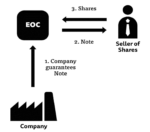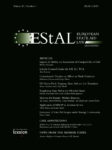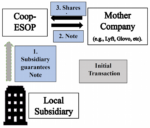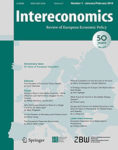This paper shows that implicit assumptions about the numeraire good in the Kaldor–Hicks efficiency–equity analysis involve a ‘‘same-yardstick’’ fallacy (a fallacy pointed out by Paul Samuelson in another context), a special case of the Petitio Pricipii fallacy.
European ESOP
The American Employee Stock Ownership Plan or ESOP is a leveraged buyout mechanism so that the employees in a company can, in effect, do a leveraged buyout of part or eventually all of their own company. ESOP is one of the most successful and unifying models for employee ownership in the world. The purpose of this paper is to analyze the main features of the US ESOP model and to define a technical description of the European ESOP, which builds on the good features of the US model and improves the flawed features.
Marcora Law for Europe
There is a time-tested solution in Spain and Italy that provides liquidity to such enterprises in a democratic manner by establishing employee ownership schemes. The new source of liquidity is allowing unemployed workers to capitalize part of their unemployment insurance to invest in a new or existing enterprise where they will have a job.
Using ESOPs to Democratize Labor-Based Platforms
Our purpose is to propose another complementary approach, which is democratizing and adapting the Employee Stock Ownership Plan to gain co-ownership in the local subsidiaries of the labor-based platforms (LBP). This option puts a new tool in the hands of the municipal and national authorities that could regulate the platform sector.
Towards Abolishing the Renting of Persons
This paper is a write-up of a speech given in 2017 at a centennial ‘celebration’ of the 1917 Russian Revolution at the Haus der Kunst in Munich.
Conceptual Errors in the Arrow-Debreu Model
The highly mathematical nature of the Arrow-Debreu and other similar models of general equilibrium hide rather than elucidate the nature of equilibrium in a private property market economy where all factors of production may be purchased or rented.
COVID-19 Aid to Promote Employee Ownership
The premise of this paper is that state aid to distressed companies should benefit not only the current owners but also the employees, who are the ones taking personal risks to continue or restart companies.
Comments on Universal Basic Income
This is a draft paper called “UBI: A Bad Idea Whose Time has Come?”. The income supplements supplied due to the coronavirus pandemic have put the UBI back on the policy agenda, so it is appropriate to re-examine the idea. Click here to download the paper.
Classical Liberalism and Workplace Democracy
This is a paper coauthored by Tej Gonza for the European Liberal Forum, the foundation associated with the Lib-Dem parties of the EU in the EU Parliament. It explores the support for workplace democracy given by democratic classical liberals such as Tocqueville, Mill, Dewey, and Buchanan.
Interview at Norwegian Thinktank Manifest (English trans.)
English translation of June 2018 interview at Oslo think-tank Manifest.







